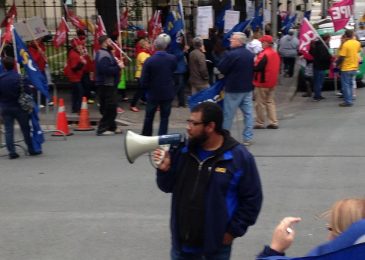I originally wrote this story for the excellent RandkandFile.ca.
KJIPUKTUK (Halifax) – The Nova Scotia Government and General Employees Union (NSGEU) with 31,000 members is the largest union in Nova Scotia. In May of this year, MacLean was elected its new president after Joan Jessome retired. MacLean worked as a corrections officer in Sydney.

In the Fall of 2014 MacLean, was forcefully wrestled to the ground and arrested during protests at the legislature by health-care workers angry about the provincial Liberals efforts to weaken their unions. Charges for assaulting a police officer were later dropped and the Halifax Regional Police publicly apologized to MacLean.
“I believe, one, I’m targeted as a leader in this union and, two, I’m targeted as a black man making noise,” MacLean, who is African Nova Scotian, told reporters at the time. “We know what Nova Scotia is all about, it’s a racist province.”
We met with Jason MacLean to talk about his experiences with racism in Nova Scotia, and the role unions must play in fighting it.
On racism at work and becoming a union activist
I started out working in a place that didn’t respect race. There were a lot of jokes about Black persons. I struggled with that, so much so that I started challenging my coworkers, I’d invite them to step outside, whatever. That jail was a bad place at that time. It was just the culture in that jail. I know of at least two people that quit, saying I am not working with these people.
There were two activists in the union who took on leadership positions at that time. They advocated for me and helped me along in the workplace, and gave me the confidence that my issues were valid. They were strong union people. Not only that, they believed in equity. Both were white men, they stood up for me and I really appreciated that.
They represented me when an offender has offensive tattoos, swastikas and whatever. They are allowed to wear that in their own personal area, but when they move into the common area they are to put a sweater on and cover it up. Those two people were my support.
When they asked me to become active in the union, I answered it. I became the vice president of the local. Ever since I had that support within the local. We now have zero tolerance in the Cape Breton prison. The struggle then becomes to getting things reported.
Based on my experience of becoming active in the union (beyond the Local), I’d say arms are wide open. I will tell you, people treated me as Jason coming from Cape Breton, there was no issue when I became active in the NSGEU about me being a black man.
On privilege and getting the message across
In our union history we have had people of colour rise to leadership positions, no matter what hindrances there might have been. In 1972 we had a president who was a Black person as well, his name was Noel Johnson. He wasn’t elected as president, but he was elected to the executive and assumed the role when the president retired. I am not saying that the NSGEU is perfect. There are not enough people of colour who are active in NSGEU, and that is something I would like to change.
But sometimes (white) people simply don’t see it. That’s why I always tell people about privilege. When I tell somebody that Nova Scotia is racist, like I did when I got arrested, people get their backs up. But Nova Scotia is racist, and I am not looking for people to apologize for having privilege, I just want people to acknowledge it.
So what I tell white people is that if I go to the Bay some security guy will follow me. Do you ever have to look over your shoulder to see if somebody is following you? That’s the example. Or, do you get uptight if you see a police officer pull up behind you? And my second question there is, how often do you get pulled over? I bet you my stats will be a bit higher…
We still today have workplaces like that jail when I started working there. Members cope with it. What I hope to do is have our staff better equipped to deal with those situations. If staff learn about those situations happening, or our members learn about it, we have our education officer go out. Because she’s a white woman she is sometimes challenged by some of our membership. Meanwhile, when I deliver the program I don’t get challenged like that. Maybe because I am a person of colour people sense that I speak with authority.
Leveraging the power of the union in the community
I just attended a meeting with members asking if they can team up with me to take an inventory of all the Black organizations here that fight for equality. Historically these groups have tended to work independently from one another.
Then we want to get all together and discuss next steps for African Nova Scotians. We all have the same issues. Let’s talk about a more collective approach and uniform messaging so that it becomes a broader issue for the government. When the government first came in they stopped funding CACE (the Council on African Canadian Education), and there was no uproar about that, although there should have been. It affects my children, my grandchildren.
The need for diversity in the workplace
The workplace is where you are most likely to meet people who are different from you. You easily spend a third of your life in the workplace. At one time laughter would all of a sudden stop when I walked into the guard lounge. They would have been laughing at jokes about Blacks. That doesn’t happen anymore. When offenders say racist things they get written up.
If you only have white employees at a workplace then there is no diversity and there is no perspective to change anything. The only way you change that is by hiring people.
Kevin Brooks, the former (African Nova Scotia) captain in the Burnside Correctional Centre, has a human rights board hearing coming up. He kept getting passed over for promotions. I told the director at the time you need to fix this, you overlooked your most senior captain. What you need to do is create a job share opportunity for him. All these people who are senior managers now would have been trained by him. He was more than qualified. He was the most respected manager in corrections, a level-headed man.
Now I am president of this union, yet I will never say we’re done. I don’t want to come off as person who has reached the top and now everything is great. It isn’t, and there is always work to be done.
There are lot of people struggling at the workplace, and I have many friends who have been off work sick because of the issues they faced in the workplace. 17 years ago I was three months into my new job, and I had to take time off from work. I couldn’t cope anymore, I was losing it and my doctor said I had to take time off.
I realized that I needed to find some sort of outlets. That motivated me as well to get involved in the union, and it all began to come together. I was a very lucky man. And I got that lucky because of the people that rallied around me.
See also: I can’t see this injustice continue. An interview with Lynn Jones



